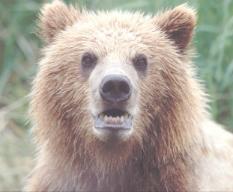
A conservation officer in Prince George, B.C., used his CPR training to save a bear's life after it was tranquillized. This photo was captured by cell phone camera.
Gary Van Spengen's conservation team was called to a residential neighbourhood Monday after a female bear was spotted in a tree. A biologist tranquillized the bear while it was up the tree, and after what Van Spengen described as a "soft landing," the bear stopped breathing after it hit the ground, but still had a heartbeat.
Van Spengen said he has never seen a bear stop breathing after being tranquillized in his 20 years as a conservation officer. "We could tell the heart was still beating … but the chest wasn't moving at all. I didn't want to lose this bear because I wanted to get a radio collar on it, so I started doing chest compressions on the bear to try to get air in and out of the lungs," Van Spengen told CBC Radio's B.C. Almanac on Tuesday .
While he said he did consider mouth-to-mouth breathing, another component of cardiopulmonary resuscitation (CPR), Van Spengen jokingly said, "[Bears] usually don't carry breath mints." Van Spengen said it was similar to doing chest compressions on a person, where the diaphragm is pushed up and down, to move air in and out of the chest cavity.
"I've gotten a bit of razzing from it, but it's all in good fun," he said. After 10 to 15 minutes, the bear started breathing on her own. After being fitted with a radio collar, the bear was released south of Prince George.
Conservation officers plan to track the bear's movements as part of a study on the interaction between humans and bears in the area. Van Spengen said this particular bear was a good candidate because it hadn't started eating garbage, so would not be considered a nuisance bear. "She's wandering around doing bear things right now, eating and trying to fatten up for the winter," he said.
Source: CBC news




